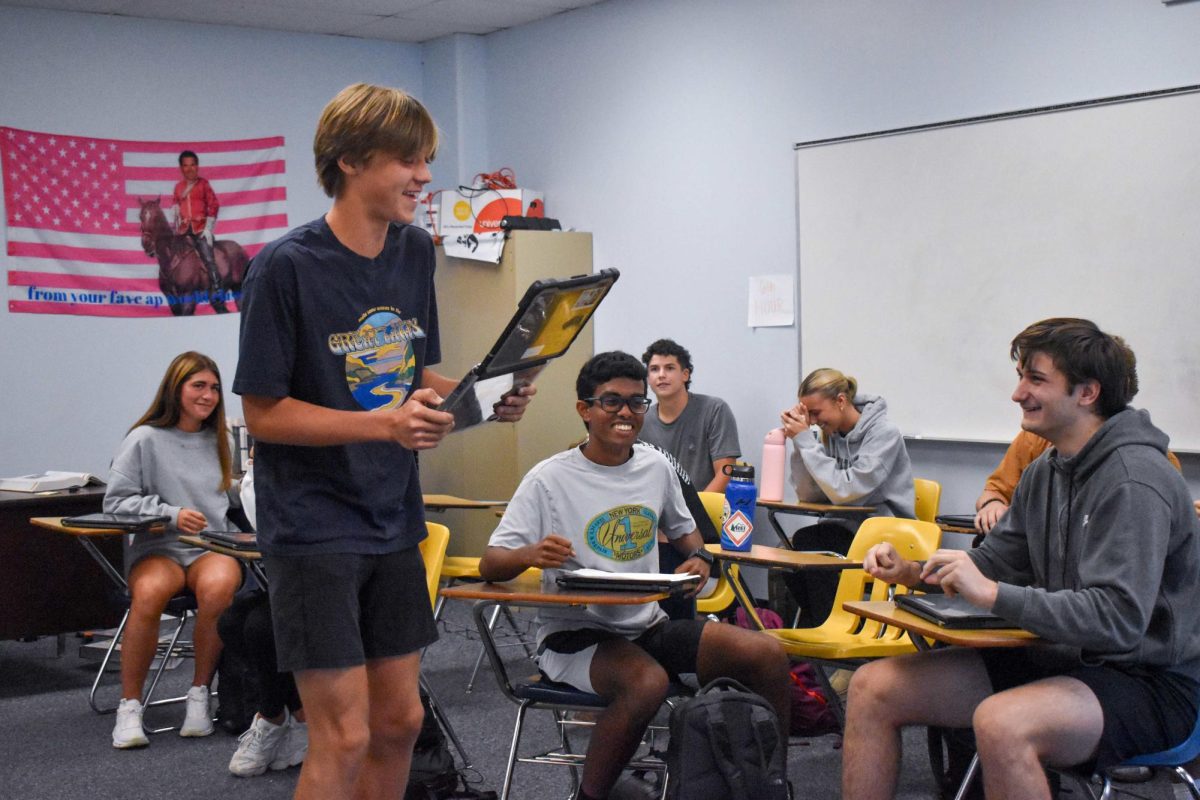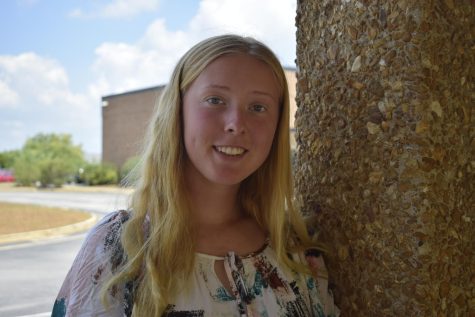Past the towering brown brick walls with spires pointing skyward inside the halls of Washington UniversityŌĆÖs labs, senior Lauren McLeod assists in carrying out the latest brain-development tests on children. Some studies consist of asking the child a series of questions and seeing their responses. This could help Lauren and the team understand how, when and why gender bias and racial judgment come into play. As a research assistant, McLeod works in a social cognition and development lab with a professor, graduate students, doctoral students and undergraduate students.
“I took a Neurobiology class at Washington University my sophomore summer going into junior year, and I thought, ‘I like this,’ followed by a lot of research on what I want to major in in college. Then I came across Washington University’s Diversity labs. After researching the professors, I met with them, and they asked me to be a part of their lab,” McLeod said.
McLeod continues to go to the labs on Mondays, Wednesdays and Fridays to work with the group, even during the school year. She dove into the internship without having any prerequisite classes.
“It was [a lot of] self-discovery. I had a lot of time and liked this, so I went into it. Our school offers AP Psychology, but I think cognitive science is a little different, so I didn’t take that. [The only] class I’m taking right now that’s on track with [my major] would be AP Computer Science [because] I do a lot of computational work in the lab. Besides my Neurobiology class that [I] took [at] Washington University a few summers ago, I didn’t have a prep work class,” McLeod said.
Despite not having a previous background, McLeod assists her coworkers. This can mean thematic coding, analyzing qualitative data, community outreach and running tests on the child candidates.
ŌĆ£We work in a social cognition lab that measures race, socioeconomic status and gender Basically, we work with affinity groups. [Often] we have children come in, and we show them a video on racial disparity. [Then] I’ll say, ŌĆśDo you think that one child is more deserving because of their race?’ŌĆØ McLeod said.
The scenarios often occur in a school, where the students are asked to identify the differences and why they exist.┬Ā
“We show them pictures of kids and [ask], ‘What’s the difference[s] between this kid and this kid? We look to see if they can measure gender or race. We have found that usually, kids who are younger don’t see race, it usually depends on their parents; if their parents are willing to talk about race, or their parents [teach a] color [blind] philosophy,” McLeod said.
The ‘color blind’ philosophy took hold as a way to see everyone as equals. But, in ignoring these traits, McLeod believes that people can forget to celebrate their culture and the effect racism still has in on society.
“[To me, it] doesn’t make sense to ignore those obvious factors in the history of America and try to put those systemic things in the past when they’re not,” McLeod said.
Their studies have shown that the child’s environment roughly translates to what the child believes. This environment is affected by the parents’ political backgrounds and their ideologies.┬Ā
“[After the home environment], it depends on schooling. A lot of private schools will look to less colorblind teachings because they are not normally as diverse as public schools,” McLeod said.
McLeod appreciates the opportunity to meet and work with people she would not normally, to explore the college’s campus and to get job experience for the future.┬Ā
“It was a good experience to get out of my comfort zone because I’m in the bubble of West County. [Through this internship] I was able to go to festivals, farmers markets and meet a lot of new people I would have never been able to meet. I got to learn a lot of new things, so [it] was influential,” McLeod said.

![At the entrance to Washington University, senior Lauren McLeod poses in front of her workplace. Through her internship at Washington UniversityŌĆÖs Social Cognition and Development lab McLeod exposed herself to a possible future career field. ŌĆ£I'm hoping to work on similar research, major in cognitive science, and expand more in [this] topic. This [opportunity] has impacted my life in a lot of [different] ways,ŌĆØ McLeod said.](https://pwestpathfinder.com/wp-content/uploads/2022/10/image1-900x542.jpg)


![Freshman Daphne Stokes looks at a table with Veterans Day flyers and information on Nov. 11. Stokes, along with other West High students, like senior Alexander Lewinski, passed by the table in the cafeteria with army recruitment information and giveaways for students to observe during lunch. ŌĆ£Talking with [the recruiters] has definitely helped me [find] where I wanted to go, more than anything else,ŌĆØ Lewinski said.](https://pwestpathfinder.com/wp-content/uploads/2025/11/DSC_1227-2-1200x800.jpg)
![Helping a customer, print room assistant Gretchen Williams operates her booth at the West High Craft Fair from Oct. 25-26. This was WilliamsŌĆÖ first time participating in the Craft Fair with her new craft shop, Gs Beaded Boutique. ŌĆ£People have always said, over the years, ŌĆśyou should open something.ŌĆÖ [I replied that] I would rather just make [my crafts as] gifts for people. I just started [the online store] up, and it's been okay. I'm always surprised [by] how many views I get and [the] people from different states buying things; somebody from Alaska bought something the other day.ŌĆØ](https://pwestpathfinder.com/wp-content/uploads/2025/11/DSC0451-2-1200x799.jpg)
![Gesturing toward the clubŌĆÖs name on the board, Global Youth Aid co-president year Daniah Alsagheer discusses upcoming service projects with members during a meeting on Oct. 30. ŌĆ£We might be one club at one school, but together, weŌĆÖre [part of] something much bigger,ŌĆØ Alsagheer said.](https://pwestpathfinder.com/wp-content/uploads/2025/11/DSC00949-1200x800.jpg)
![Focused on providing exceptional service, sophomore Darsh Mahapatra carefully cleans the door of a customerŌĆÖs car. Mahapatra has always believed his customers deserve nothing less than the best. ŌĆ£[If] theyŌĆÖre trusting us with their car and our service, then I am convinced that they deserve our 100 percent effort and beyond,ŌĆØ Mahapatra said.](https://pwestpathfinder.com/wp-content/uploads/2025/10/DSC_0018-1200x800.jpg)
![Sophomore Aleix Pi de Cabanyes Navarro (left) finishes up a soccer game while junior Ava Muench (right) warms up for cross country practice. The two came to Parkway West High School as exchange students for the 2025-2026 school year. ŌĆ£The goal for the [exchange] program is to provide opportunities for both Parkway students and our international exchange students to learn about other cultures, build connections and become confident, capable, curious and caring ŌĆö ParkwayŌĆÖs Four CŌĆÖs ŌĆö in the process,ŌĆØ Exchange Program Lead Lauren Farrelly said.](https://pwestpathfinder.com/wp-content/uploads/2025/10/Feature-Photo-1200x800.png)

![Gazing across the stage, sophomore Alexis Monteleone performs in the school theater. The Monteleone familyŌĆÖs band ŌĆ£Monte and the MachineŌĆØ has been releasing music since 2012, but Alexis started her own solo career in 2024 with the release of her first single, Crying Skies. ŌĆ£My whole family is very musical, [and I especially] love writing [songs with them],ŌĆØ Monteleone said.](https://pwestpathfinder.com/wp-content/uploads/2025/09/DSC7463-1200x798.jpg)
![Amid teaching a lesson to her AP Calculus BC class, Kristin Judd jokes alongside her students in their funny remarks. Judd has always enjoyed keeping the mood light in her classroom, along with on the volleyball court. ŌĆ£[I enjoy] that side talk where you see [or] overhear a conversation and chime in, or somebody says something funny,ŌĆØ Judd said.](https://pwestpathfinder.com/wp-content/uploads/2025/09/image-1200x730.jpg)
![Eyeing the ball, junior Ella McNeal poses for her commitment pictures at Clemson University. McNealŌĆÖs commitment comes after months of contact with top Division 1 soccer programs. ŌĆ£ It has taken a lot to get to where I am, but I know that [what] I've already been through is just the beginning, and I can't wait for what is to come,ŌĆØ McNeal said.](https://pwestpathfinder.com/wp-content/uploads/2025/09/IMG_4926-1200x900.jpeg)

Dr. Piffel • Nov 9, 2022 at 9:16 am
What an awesome opportunity, Lauren! I would love to hear more about it! Dr. Piffel
Serena Liu • Nov 2, 2022 at 12:03 pm
Great story Grace!